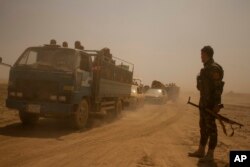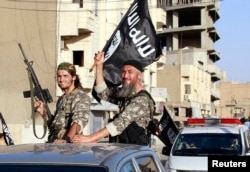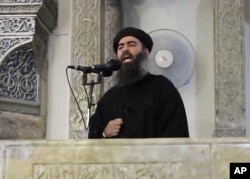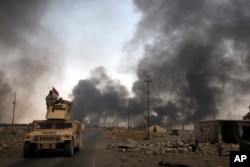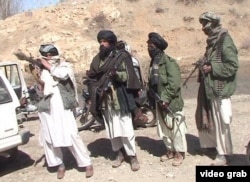The U.S. strategy against Islamic State extremists figured prominently in the first presidential debate Monday night. The candidates, Democrat Hillary Clinton, 68, and Republican Donald Trump, 70, offered starkly different takes on defeating the extremist group, raising the question: How accurate were their comments on IS?
To find out, VOA asked a few experts to evaluate the candidates' statements on IS.
Clinton on IS in Iraq
"Our military is assisting in Iraq. And we're hoping within a year we'll be able to push them out of Iraq.”
The U.S.-led coalition has been helping a combination of Iraqi, Kurdish and Arab forces fight IS in Iraq.
IS has been mostly rooted out of Anbar province and the coalition is setting its sights on a big battle for Mosul, currently an IS stronghold in Iraq. Analysts and commanders on the ground say Clinton is likely overly optimistic in saying that IS will be uprooted from Iraq in a year.
Barham Aris Yasin, a Kurdish commander on the front line of northern Mosul, said in an interview with VOA that pushing IS out of Iraq will take at least three years "if the American role remains as its now.”
"Iraqi forces are divided across religious and ethnic lines. I doubt they can defeat IS in one year," Yasin said. "America needs to increase its role and unite all the forces under one umbrella. It has to command the forces on the ground.”
Dlawar Ala' Aldeen, founding president of the Middle East Research Institute, said it could take generations before Islamic State militants are completely defeated in Iraq.
"IS is a political, military and social actor. Its defeat militarily does not lead to its elimination politically and socially," he said. "You can take away the control of land and population from IS, but unless tackled comprehensively, its political and social influence will remain for generations to come.”
Trump on Clinton's failure to curb IS
"No wonder you've been fighting ISIS your entire adult life."
The timeline of the birth of the group and its rise does not support this claim. IS was created following the withdrawal of the majority of U.S troops in Iraq in 2013. A year later, IS leader Abu Bakr al-Baghdadi formally declared an Islamic caliphate after fighting the Iraqi army and rapidly taking control of territory in both Iraq and Syria.
Clinton was 66 years old when al-Baghdadi declared a caliphate.
Clinton on combating IS online
"We need to do much more with our tech companies to prevent (IS) and their operatives from being able to use the internet to radicalize, even direct, people in our country, in Europe and elsewhere.”
This policy is similar to an Obama administration initiative already in place.
The State Department recently announced that it has begun working with private-sector partners on a program to combat the group's extremist messaging on social media platforms. It is partnering with an affiliate of Google to disrupt IS online recruiting efforts by targeting advertising, algorithms and the use of YouTube's video platform.
"What she mentioned in the debate was an assertion of Obama's current policy on combating IS online," said Dlshad Othman, a digital security expert in Washington. Clinton "was actually part of this approach when she was secretary of state. She was pushing for more involvement by private-sector companies.”
Trump on IS oil
"Had we taken the oil — and we should have taken the oil — ISIS (Islamic State) would not have been able to form either because the oil was their primary source of income. And now they have the oil all over the place, including the oil, a lot of the oil in Libya.”
On the campaign trail, Trump has often made the argument that IS would be unable to launch deadly attacks if they didn't control oil fields in Iraq. He has said that President Barack Obama should have given the order to seize IS oil operations, cutting off its lucrative smuggling business that helped fund the group.
But, under international law, the United States cannot seize Iraq's oil. U.S. forces have also targeted IS oil production facilities, leading to IS militants losing control of some oil fields.
"Oil revenue gave IS a bloom for a period of time and now does not play a major role," said Seth Frantzman, an Israeli-based Middle East commentator who recently made a trip to Iraq to assess the status of IS.
"Oil has lost much of its significance because of difficulties to exporting it due to border issues,” said Frantzman, the op-ed editor for The Jerusalem Post.
"At this point, [IS militants] don't rely on oil revenue as their major source of power to move their vehicle. We can see that they burn oil in order to distract air raids and hinder attacks," he said.
As for IS oil holdings in Libya, David Mack, a scholar at the Middle East Institute and former U.S. ambassador to the United Arab Emirates, said in an interview with CNBC recently, IS "never controlled any oil exports or sales from Libyan production."
"It's possible that they were in a position to extort money from some Libyan militia who had control over oil wells, but that would have only been indirect," Mack said.
Clinton on Trump's 'secret plan' to fight IS
"He says it's a secret plan, but the only secret is that he has no plan.”
On the campaign trail, Trump has vowed to "utterly destroy ISIS" and "bomb the hell out of ISIS." But he has yet to outline in detail his plan to combat IS as president, saying he doesn't want to tip off the enemy.
On the eve of Monday's debate, Trump's campaign manager, Kellyanne Conway, said during an appearance on MSNBC's Morning Joe that Trump "certainly has a plan.”
"I've heard it," Conway said. "He'll tell you if that question is asked. He'll be happy to offer specifics without telling the enemy exactly what we're going to do.”
But when pressed by Clinton during the debate, Trump did not take the opportunity to disclose more details.
Trump on IS in more than 30 countries
"But you were there and you were secretary of state when it (IS) was a little infant. Now it is in over 30 countries and you are going to stop them? I don't think so.”
It is hard to assess IS's presence in varying parts of the world, according to experts.
Mainly in Iraq and Syria, IS claims on its website that it has ties to 26 countries. IS has also claimed responsibility for terror attacks that are sometimes lone-wolf incidents. Law enforcement officials say those links are more ideological than direct.
"It's difficult to know what Donald Trump meant," said Mara Revkin, a Middle East expert at Yale University.
"If he means spreading in terms of IS's actual state-building activities on the ground, then the number is substantially inflated," Revkin said. "IS has declared 'provinces' in only 10 countries, and of those, the group has only established governance institutions, such as courts, police departments and municipal services, in three — Syria, Iraq and Libya.”
"If Trump means 'spreading' in terms of ISIS's ability to directly conduct or indirectly inspire attacks in other countries, then the number of countries where such attacks have occurred is around 20,” Revkin said.
"But that said, mere exposure to ISIS propaganda alone does not lead to radicalization,” she said. "If that were true, researchers like me would all be brainwashed by now. It's very difficult to observe or measure the 'spread' of ideas, so I would be cautious about claiming that ISIS's influence is 'spreading' without clear evidence.”
Clinton on targeting IS leadership
Clinton said that she “would also do everything possible to take out (IS) leadership.”
This strategy would be an extension of Obama administration’s policy of targeting influential IS figures in Iraq and Syria. Since the beginning of the U.S.-led coalition campaign against IS, dozens in the IS hierarchy have been killed in airstrikes and drone raids.
Chief IS spokesperson Abu Mohammad al-Adnani was killed in a U.S. strike in August. In July, the U.S. targeted two senior commanders: Basim Muhammad Ahmad Sultan al-Bajari, the terror group's deputy minister of war, and Hatim Talib al-Hamduni, an IS military commander in Mosul.
Also, Abu Omar al-Shishani, IS minister of war, was killed in a U.S. airstrike in March. In another strike in the same month, Abd al-Rahman Mustafa al-Qaduli, IS minister of finance, was killed.
"The Obama administration has been successful for now and it was able to [get] top IS commanders, including Al-Shishani and al-Adnani," said Ahmet S. Yayla, deputy director at the International Center for the Study of Violent Extremism (ICSVE) at George Mason University.
Yayla added that IS has "lost many of its top commanders through these surgical operations."





